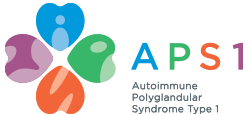We are delighted to publish the official rapporteur’s report from the 4th International Symposium on APS Type 1 written by Dr. Si Yue Guo! Please click on the button below to download the report.
If you missed the symposium, you are also welcome to check out our video recordings using the links below as well.
We were very fortunate to have four incredible speakers present on multiple aspects of APS Type 1 during our Fourth International Symposium held (virtually) on September 18th of 2021. The following is a very brief summary of some of the major points that were brought forth by these very knowledgeable physicians and researchers:
Dr. Paul Bastard spoke about the risks for APS Type 1 patients developing severe symptoms from COVID 19. He also recommended that this patient group avoid live attenuated vaccines, opting for, e.g. an mRNA vaccine instead.
Dr. Michail Lionakis presented three case studies and discussed the management of COVID-19 in APS-1, depending on whether the patient is in an early ambulatory phase or a late hypoxemic (low blood oxygen) phase. He recommended treatment with interferon-beta (IFN-β) or a cocktail of monoclonal antibodies targeting the spike protein (anti-S mAbs). Preliminary results (as of September 2021) suggest that monoclonal antibodies are safe and don’t inhibit natural immune response, and it is recommended as an early treatment if IFN-β is not accessible.
Sara Vazquez, an MD/PhD trainee at the University of California, San Francisco, in Dr. Mark Anderson’s lab reported on the discovery of seven novel autoantigens and that clinical phenotyping revealed novel associations between autoantibodies and certain autoimmune diseases. She elaborated on the disease associations with three common APS-1 manifestations: Anti-RFX6 antibodies are associated with intestinal dysfunction, Anti-KHDC3L antibodies are associated with primary ovarian insufficiency (POI). Anti-ACP4 antibodies may be associated with dental enamel hypoplasia. The study of the autoantigens, proteins and tissues targeted by the autoantibodies, enables an improved understanding of autoimmune disease mechanisms and can inform future diagnostics (useful disease biomarkers) and treatments (immunotherapy).
Dr. Maureen Su presented studies on two skin conditions, vitiligo and melanoma, showing that autoimmunity and anti-cancer immunity are linked: antibodies that activate immunity improve survival in advanced melanoma. Since APS-1 patients have reported cases of oral, esophageal, and gastrointestinal cancers, Dr. Su recommends that patients increase their awareness of oral cancer and conduct routine surveillance for abnormal growths in the mouth by consulting with their dentists. APS-1 patients should also avoid smoking and treat candidiasis aggressively if infected.
